Tilburg University staff find out about their retirement nest egg
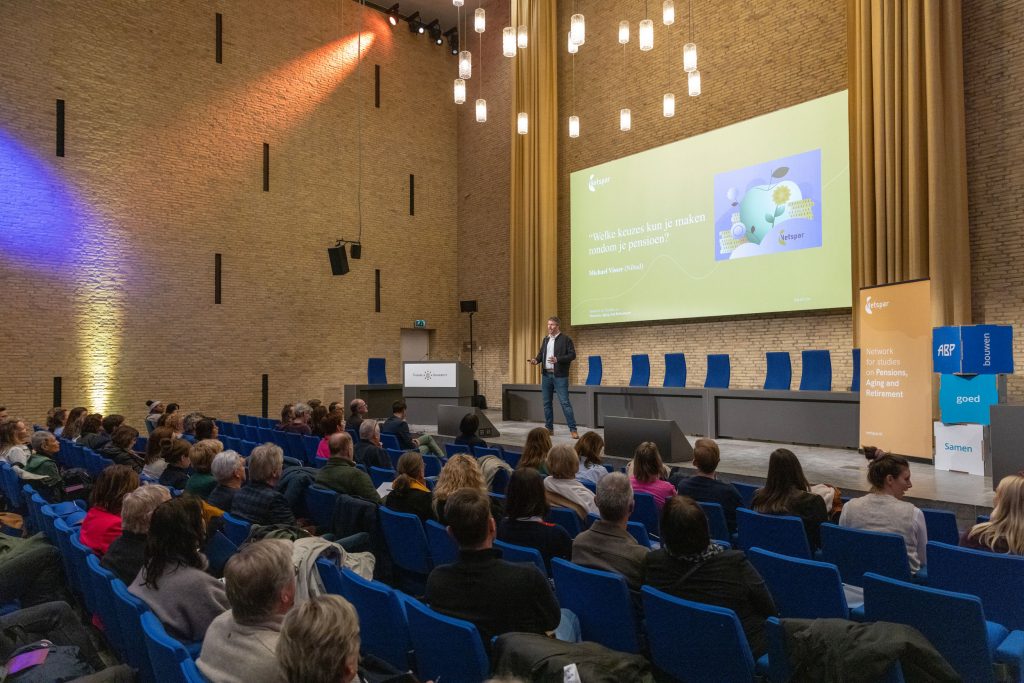
Have you already made arrangements for your retirement nest egg (in Dutch: appeltje voor de dorst)? Under this heading, Netspar organized a successful public event for Tilburg University staff on Thursday, January 25, in cooperation with ABP, the Dutch pension fund for employees in the government and education sectors, and Nibud (National Institute for Family Finance Information). In a packed Auditorium, the speakers provided practical information on pensions. From the Wheel of Five Guidelines for Pensions to the relationship between vacuuming and looking into your pension.
The pension event starts with a thought experiment. “I would like to ask you to close your eyes for a moment,” says Netspar director Lisa Brüggen. Hundreds of listeners dutifully close their eyes. “Try to imagine yourself as a pensioner,” she continues after a brief silence. “Where do you live? What people do you have around you? And what holidays do you enjoy? When you have formed a clear picture, what do you see?” From the perspective of her own children, she shows drawings that depict retirement as a house to receive guests and a nursing home. The thought experiment is one of the ways the future comes to life during the event.
That not everyone is regularly thinking about and planning for retirement becomes clear during the kick-off of the pension event by moderator Mathijs van Dijk. “I have an awkward confession to make,” says the scientific director of Netspar. “I’ve been working at Netspar for three and a half years now and follow pension developments closely, but it was only this morning that I logged on to Mijnpensioenoverzicht.nl and MijnABP for the first time. And that is exactly why we need to talk about pensions today. You want to inform yourself about the impact on your pension of the choices you make now, but most people fail to do so until that moment is approaching fast.”
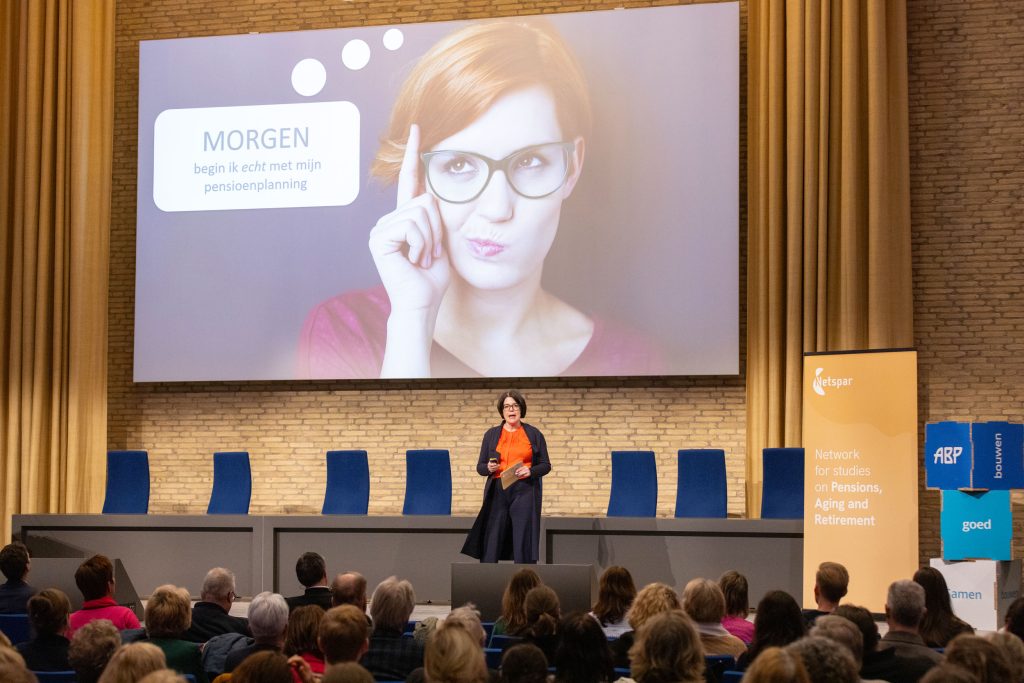
Rather vacuum or iron
In her story, Brüggen illustrates that we are more likely to think about other things than pensions. “There is research showing that people would rather spend more time choosing a flat-screen TV or tablet. In addition, there is even research showing that people would rather vacuum or iron than look into their pensions.” Still, Brüggen says it makes sense to do so, because retirement is “just really important, because we all want to live a very long time”. The aim of the pension event is therefore to provide a lot of information and inspiration on this subject. Brüggen: “We want you to go home and say: tomorrow I’m going to work on my pension.”
How do you do that? Brüggen: “Very concretely, this actually involves three questions you can ask yourself: where are you now? What do you want? And how do you get there? With these three questions, the earlier you find out, the better. If you deal with it in time, there are still a lot of screws to turn if you want to close any gap.” Adding, she gives examples of life events that can have an effect on your pensions, such as working less, buying a house or getting married. By being aware of the impact, you can better prepare yourself for your retirement. Finally, she imparts, with a nod to Mahatma Gandhi: “Save as if you were turning 100, but live as if you were going to die tomorrow.”
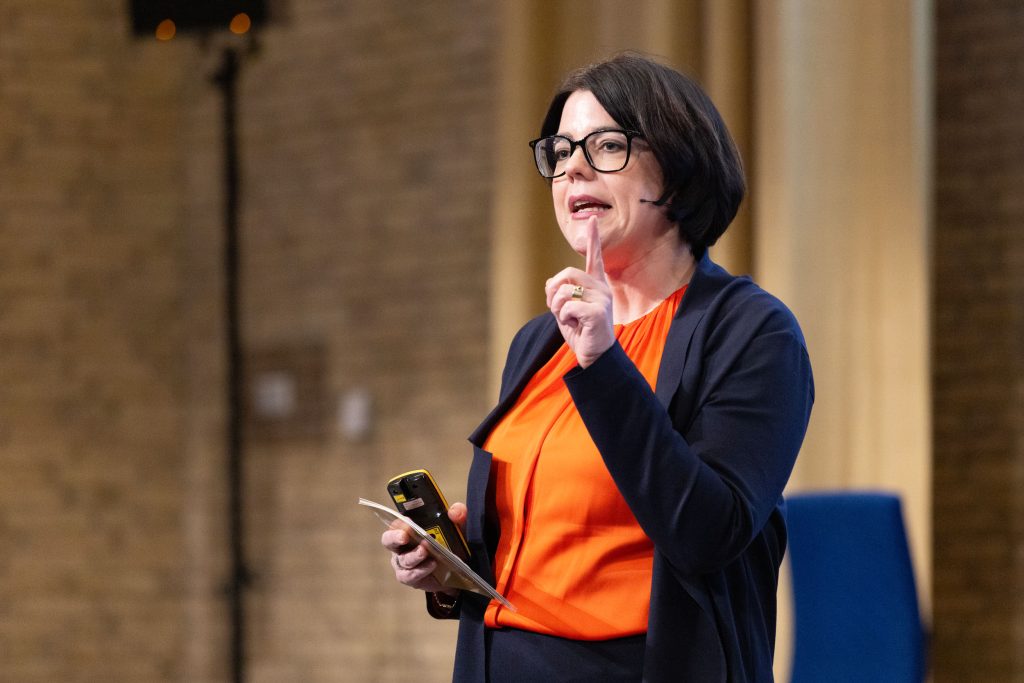
Knowledge quiz
Then it is time for a quiz to test the audience’s knowledge on the subject. What do Tilburg University staff actually know about pensions? Frank Aerts of ABP shows a statement on the screen, after which the audience indicates with a flag whether it is correct or incorrect. The first statement is: “You only save for retirement through your employer.” When a sea of flags indicates it is incorrect, Aerts says he is impressed. He then explains that you can see the Dutch pension system as a multistory house, with the AOW (state pension), the basic state pension, as the ground floor, workplace pensions as the first floor, and retirement income from personal pension products as the attic.
Another statement reads, “You know 5 years in advance what your final AOW pension age will be.” This turns out to be correct. In his explanation, he discusses the expected AOW pension age that is now known for some age groups. Aerts: “You can find the AOW pension age via the website of the Sociale Verzekeringsbank. If the final AOW pension age for you is not yet known, you get a forecast based on life expectancy.” Surprised, some listeners noted that the projected AOW pension age is 69 years and 9 months for someone born on 1 October 1990.
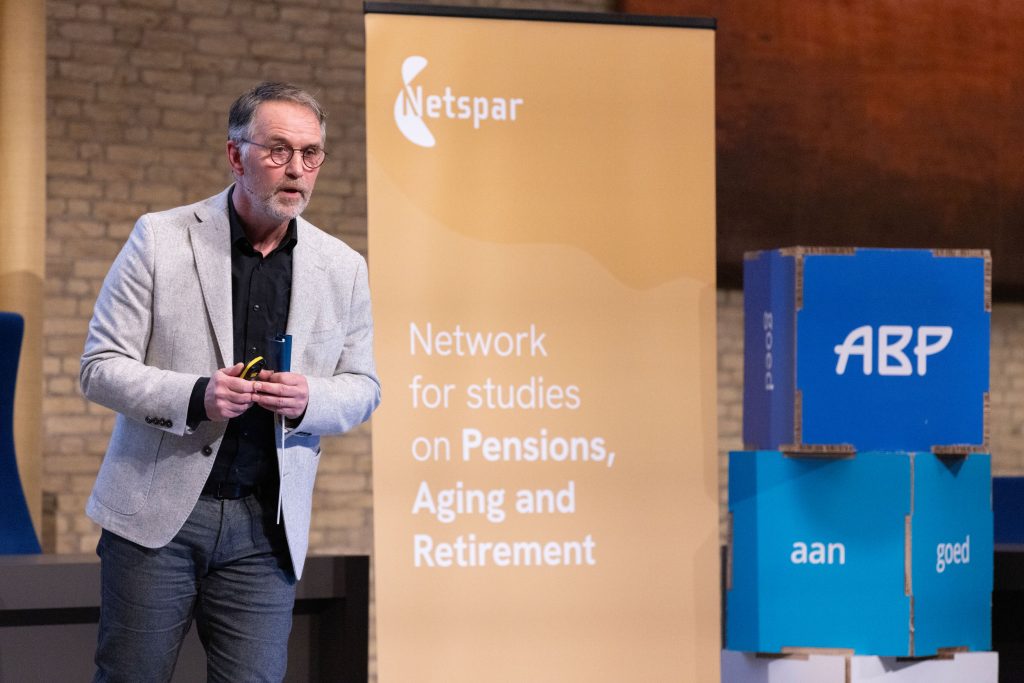
With humour, Aerts runs through the various statements. For example, when he addresses the statement, “If you die while you are living together, your partner gets a survivor’s pension from ABP.” The answer proves incorrect because, according to Aerts, an important condition is missing. This is because with ABP’s survivor’s pension, you have an obligation to register your partner, which means that you must first register them yourself. For that, you need a cohabitation agreement. “So sign up your partner, but make sure you sign up the right one,” says Aerts to the laughter of the audience.
At the end of his talk, he gives the audience many practical tips and introduces it to useful tools within MijnABP. For example, the “Overzicht & Inzicht” tool, for participants whose retirement is not imminent and just want an overview of their future income and expenses. For those approaching retirement, useful tools include the “keuzehulp” (explaining the options) and “Plan uw pensioen” (Plan your pension). These tools are explained in English in the MijnABP Reading Guide. Aerts is satisfied that many people in the audience were able to answer the statements correctly: “I’m pretty impressed. You have passed the test!”

Future Pensions Act
But who can pass the test on the Dutch Future Pensions Act? When Tilburg University Professor Bas Werker tries to poll who in the audience knows what will change because of this law, only a few flags go up. Werker: “There is a lot of discussion about the Future Pensions Act. At least almost everyone knows that something is going to change. But it’s good to know that a lot is not going to change at all,” he says. He illustrates this when discussing the current and future situations. Werker: “We are going from a tentative promise, ‘you will get this much’, to having our own pension pot, with the message ‘you will find out’. That may sound very scary, but it can actually lead to less uncertain pensions.”
Werker admits this sounds paradoxical but, under the current pension system, pensions are not a hard promise either. “Pension money is invested, so that always carries risks. Besides, people are living longer, but that also means it is more expensive to pay out pensions, which is a financial risk. The starting point will soon be: “We don’t know how much pension you will get.” That is also more transparent. So we promise less and make sure that windfalls and setbacks are distributed fairly.”
Werker illustrates this with the navigatiemetafoor. This is a picture of your Dutch pension fund that shows your estimated pension in expected, pessimistic, and optimistic scenarios. Werker: “When you are young, there can be a big difference between the amounts of pessimistic and optimistic scenarios. This difference gets smaller as you get older. So as time passes, the amount of your pension becomes more certain. In this process, your pension could possibly be even more certain under the new system than it is under the current system. I say “possibly” because this depends on how a pension scheme is designed. So this is the paradox: we promise less, but pensions may become more certain.”
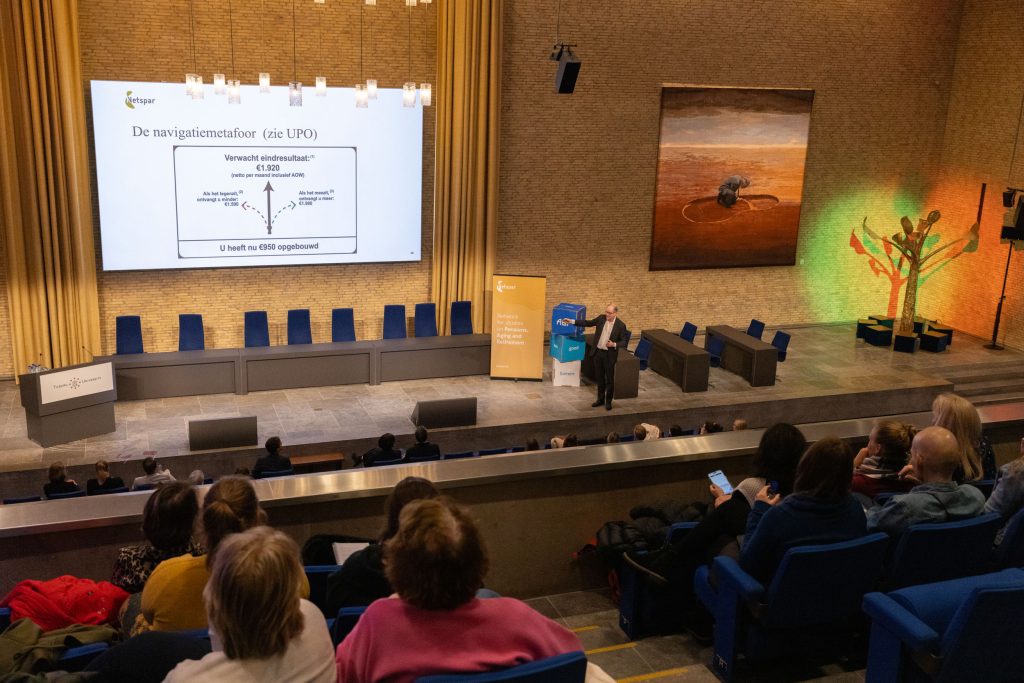
New pension at ABP
What the new pension contract looks like at ABP is revealed in the contribution by legal experts Anouk Smits and Kerstin Thoma. They link up with the previous speaker by saying that in the media it seems like a lot is changing, but a lot also remains the same. One example is the desired pension target for the old-age pension. That remains 80 per cent of average salary with 43 years of participation in the pension scheme and a retirement age of 68. However, there is a change that concerns the survivor’s pension. Where you now continue to have coverage even if you leave the pension fund, it will in principle cease in the new pension scheme. With an overview of the next steps towards ABP’s new pension scheme, Smits and Thoma conclude their story.
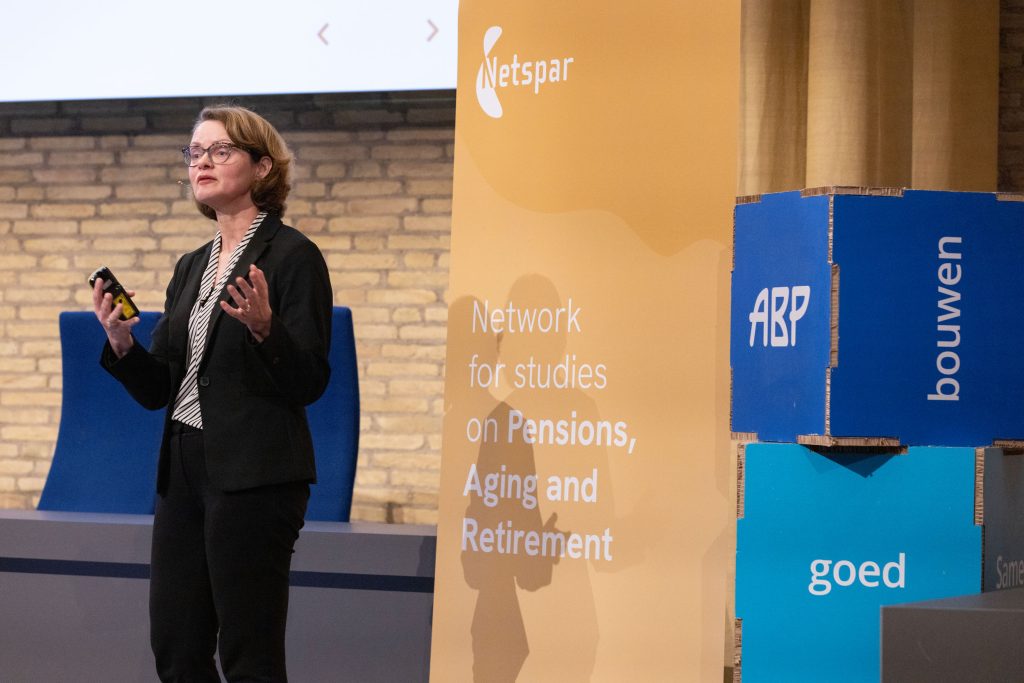
Three pension tools
The final speaker, Nibud researcher Michael Visser, is a Tilburg University alumnus, so it feels a bit like coming home for him. He has also worked here for twenty years, a period he says can be summed up in three pension tools. The first reminds him of Tilburg Professor Gerry Dietvorst, who inspired him on the subject of pensions and said that citizens “should be able to see somewhere on a website what they are going to get in terms of pension”. Together with a couple of students, he started working on what was to become Mijnpensioenoverzicht.nl years later. It has since become the go-to website in the Netherlands to gain insight into the pension you have accrued and your expected pension amount after retirement.
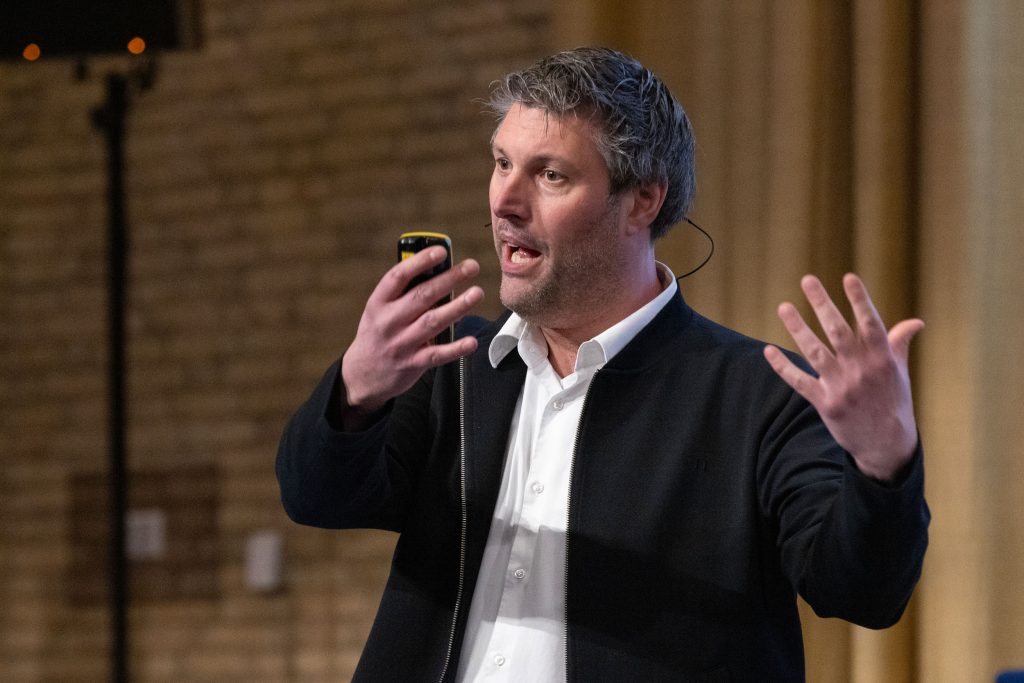
Nibud’s Pensioen-schijf-van-vijf (Wheel of Five Guidelines for Pensions) is another tool Visser collaborated on. It offers information on the impact of the choices you can make around retirement. “Of course, we copied the idea from the Wheel of Five for food, the Dutch Food Pyramid. But the purpose of this Wheel is to give better insight into future income and expenses.” Visser then discusses the different segments of the Wheel. He also uses the report Bestedingen van ouderen (Expenditures of the elderly, in Dutch) to show what expenses you can expect later in life. For example, spending on telecom, transport, and clothing decreases after retirement. However, spending on heating, food, and domestic help will increase. “These data are from seven years ago, but we will update them soon,” Visser says.
Finally, Visser discusses Nibud’s Geldplan Bijna pensioen. “This is one of our twelve money plans for all kinds of new situations, for example, for when you are almost 18 or get divorced or if you want to save, pay off a debt, or invest. When you retire, there are lots of different choices to make. The money plan will help you make them and provide you with a tailor-made action plan. This will tell you what action to take, information to gather, or arrangements to make, either yourself or with your employer or financial adviser. As Lisa Brüggen said at the beginning, you will have to take the bull by the horns.”
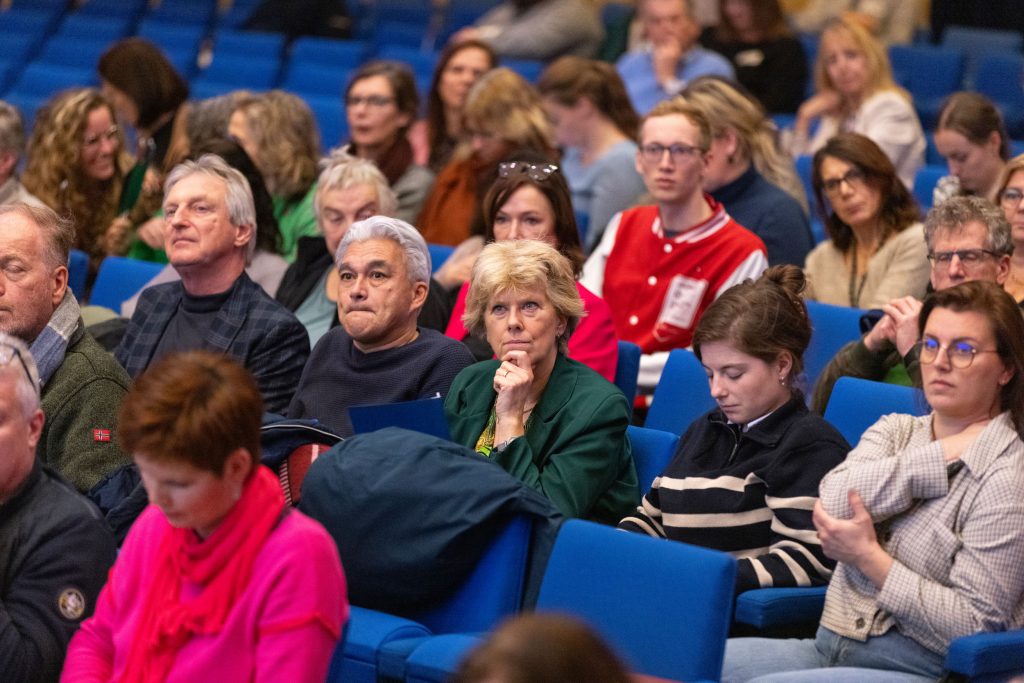
Learned something new
After this last speaker, the flags come out again. Moderator Mathijs van Dijk poses some questions to the audience, which are answered with many flags. This shows that a large majority of the audience learned something they did not know yet. Many will also take action and log on to Mijnpensioenonderzoek.nl or MijnABP, or check out Nibud’s tools. So the vacuum cleaner or iron can stay in the cupboard for a while longer.
Tip
Take a look back at the speakers’ presentations in Dutch (pdf).


